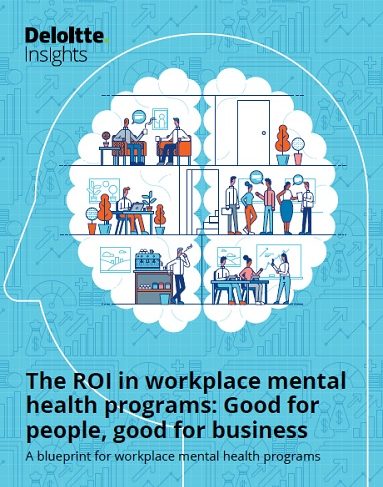
MONTREAL — Bell Canada was quick to praise Deloitte Canada’s release today of first-of-its-kind research that found major Canadian companies that implemented mental health programs achieved significant returns on investment, even in the first year.
Deloitte’s analysis revealed that companies with mental health programs in place for one year had a median annual ROI of $1.62 for every dollar invested. For companies with programs in place for three or more years, the median annual ROI was valued at $2.18 for every dollar spent.
Bell was one of 10 Canadian companies that participated in the Deloitte study, titled The ROI in workplace mental health programs: Good for people, good for business, which explored historical investment and savings data from the companies. In addition to Bell, the other companies that participated included Air Canada, ATB Financial, Canada Life, CIBC, Desjardins Group, Enbridge, Energir, Husky Energy, and Morneau Shepell.
In its analysis, Deloitte found Bell’s 2018 ROI for its workplace mental health program — first implemented in 2010 as part of the Bell Let’s Talk initiative — was $4.10. According to a Bell news release, Bell’s initiatives to improve mental health awareness, training and benefits have reduced short-term disability claims related to mental health by 20%, and have reduced relapse and recurrence since 2010 by 50%.
“Workplace mental health leadership has been a key pillar of Bell Let’s Talk, alongside anti-stigma, access to care and research, since the beginning of the initiative. We’re pleased to have participated in Deloitte’s ground-breaking study, which confirms the value of promoting mental health on the job for both your team and your bottom line,” said George Cope, president and CEO of BCE and Bell Canada, in the news release.
“We hope the clear benefits achieved by these leading Canadian companies studied by Deloitte will encourage more businesses to enhance or introduce their own mental health programs. Bell is always open to sharing our experiences with other companies interested in introducing workplace mental health initiatives,” Cope added.
Bell said in its release that the Deloitte report reinforces the value in adopting Canada’s National Standard for Psychological Health and Safety in the Workplace, which Bell adopted in 2013. Developed by the Mental Health Commission of Canada, the National Standard implementation guide helps organizations of all kinds to create work environments that support the overall mental well-being of employees, Bell said.
In its news release, Bell cited other recent Canadian studies that have highlighted the need for improvements in workplace mental health awareness and action, including: the 2019 Sun Life Barometer, which found 60% of workers struggling with mental health issues are not accessing support from their workplace benefits; and research by RBC Insurance in 2018 that found while 30% of those who have taken disability leave did so for mental health reasons, two-thirds of Canadians see workplace disability as a physical issue, with most people surveyed not viewing depression and anxiety as disabilities. RBC Insurance’s most recent research report found more Canadians are recognizing depression (53%) and anxiety (41%) as disabilities compared to last year (47% and 36%, respectively). However, a stigma around mental health still exists — three-quarters of working Canadians say they would either be reluctant to admit (48%) or would not admit (27%) to a boss or co-worker that they were suffering from a mental illness, according to the 2019 RBC Insurance survey.
In its own news release issued Monday, Deloitte Canada highlighted the following key findings from its report:
- Wellness programs are more likely to achieve positive ROI when they support employees along the entire spectrum of mental health — from promotion of well-being to intervention and care.
- Employers could achieve greater program ROI by prioritizing investing in higher-impact areas such as leadership training and preventive interventions, including psychological care benefits.
- If employers measure their baseline data and take stock of existing initiatives, many organizations would realize they have already started to use the right tools to strengthen workplace mental health.
- Putting in place mechanisms to measure performance can enable organizations to achieve desired program impact, improve adoption rates, and enhance decision-making.
“There’s both an economic and moral imperative for Canadian employers to take action, recognizing that the cost to the Canadian economy of poor mental health in our workplaces is estimated to be $50 billion annually,” said Anthony Viel, CEO of Deloitte Canada, in the company’s news release. “The findings from this report provide a business case that is impossible to ignore. Organizations committed to delivering and measuring impactful employee wellness programs are creating healthier workplaces and seeing investments in their people’s mental health pay off.”
To read the full Deloitte Canada report, click here.


